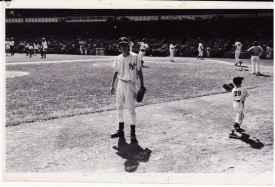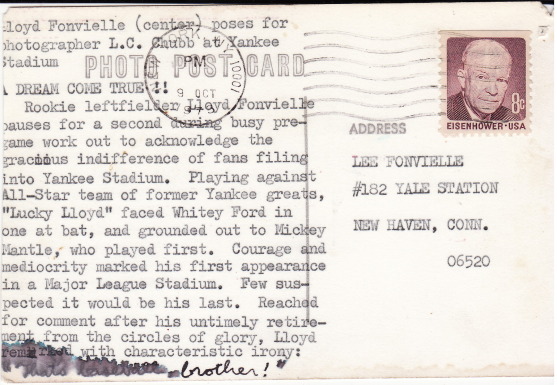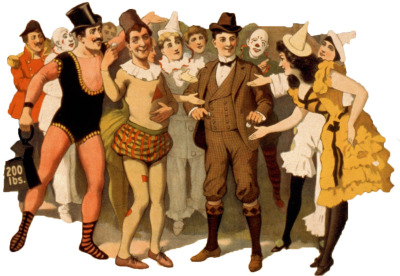Glory Days
 Postcard Photograph of the Author at Yankee Stadium, 1973 (Credit: Cotty Chubb)
Postcard Photograph of the Author at Yankee Stadium, 1973 (Credit: Cotty Chubb)
In 1973 I won a contest run by George Plimpton for the New York Yankees. You had to write a short essay explaining why you wanted to play baseball in Yankee Stadium — the prize was getting to play baseball in Yankee Stadium, one exhibition inning before a real game against a team of former Yankee stars.
I grew up hating baseball and most sports, and found all talk of them by my friends tiresome in the extreme. But the year before I won the contest, I had had a conversion experience. The date was 14 May 1972 and out of idle curiosity I was watching Willie Mays on TV playing his first game as a Met, against his old team the Giants, who had traded him away because his glory days were coming to an end. In the fifth inning Mays hit a home run that put the Mets ahead in the game, where they stayed.
With that one swing of the aging hero's bat the whole game of baseball was revealed to me — in all of its beauty, both moral and physical. I became a baseball fanatic, but a tragic one, because I had wasted my youth unconnected to the game. This is what I wrote about to Plimpton — I told him that only by playing in Yankee Stadium could I fill the hole in my life that an adolescence without baseball had created. The last line of my essay was this — "Coach, all I'm asking for is this one chance."
It may sound odd but I felt that absence of baseball in my youth as a genuine loss. "I could have played Little League!" I thought. "I could have tried out for the high school team!" I thought of all those summer afternoons when I could have been standing out there in left field thinking, "Hit it to me!" I was 22 when I had my conversion to the sport, living in the middle of Manhattan — there weren't a lot of opportunities to play a real game of baseball. I'd go up to Central Park on weekends to play catch with friends, smack the ball around a little. Sometimes I'd join a pick-up game in the park —but I was a clueless player, with no instincts for the game. I had waited too long.
Plimpton gave me the chance I'd asked him for, though, touched or more likely just amused by my plea. There were nine or ten other contest winners, including a kid of about five and a senior citizen. Before the date of the exhibition inning we got to suit up for a practice with Plimpton — I wore an old uniform of Thurman Munson’s, then a current Yankee star — on an off-day in the stadium. This was the old stadium, before it got remodeled. Plimpton himself pitched the batting practice we took. The bat I used, I recall, felt as heavy as a sledge hammer, but if you could get it around on one of Plimpton's gentle lobs, the ball would sail. I fouled a lot of balls high up into the stands, where they banged around and echoed among the empty seats. It was thrilling. Babe Ruth had fouled balls up into those stands, once upon a time.
In the exhibition game we were each announced by name over the stadium loudspeakers as we came to the plate. There wasn't much of a crowd, which probably explains why the management had hired Plimpton to conduct the contest. I faced Whitey Ford on the mound — he was lobbing his pitches in underhand — and grounded out to Mickey Mantle, who was playing first. That was also thrilling. The old stars seemed to be having a blast. Phil Rizzuto was playing shortstop and covered second on every play, to turn two, even when there was nobody on first, or when somebody flied out. The other players always fired the ball at him anyway for a dramatic finish to the at bat.
Taking the field (to play left field) I was amazed at how much space there was out there and gained a new respect for the vast amount of ground a good outfielder can cover.
After the inning, as I wandered over to greet some friends in the stands, a knot of kids stood at a rail next to the field and yelled at me to come over and sign their programs. As I approached them their faces fell, they looked down at their shoes, put their programs behind their backs and slipped away. "Not a real player," they were thinking. But I was. I played baseball in Yankee stadium. Forty years later I still think about it with pride and wonder. That hole in my life had been filled — maybe not all the way, but a little, enough.
* * *

Lloyd Fonvielle


 Monday, July 15, 2013
Monday, July 15, 2013